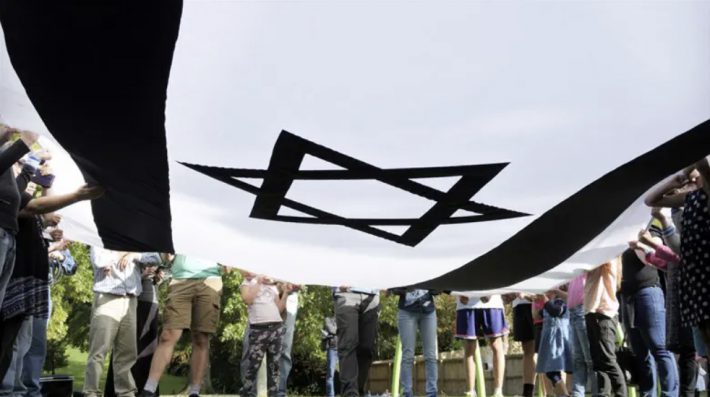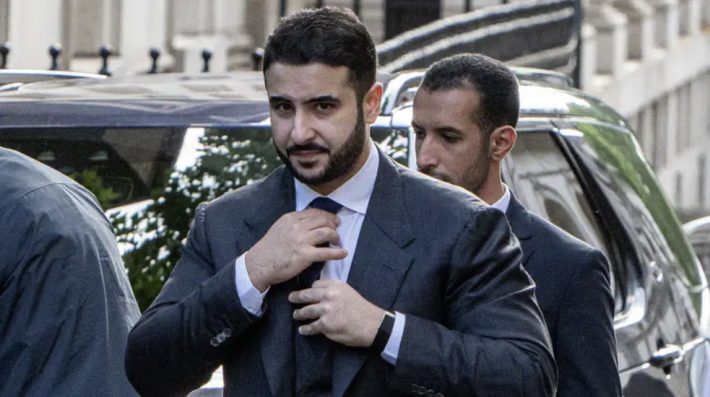The words of the Blessing of the Kohanim reverberate.
Parashat Nasso contains the Birkat Kohanim, the Priestly Blessing:
“Hashem spoke to Moshe saying: Speak to Aaron and to his sons, saying: Thus shall you bless the Children of Israel – say to them: ‘Hashem bless you and keep you; Hashem shine His face upon you and be gracious to you; Hashem raise His face to you and grant you peace’. Thus they shall place My Name on the Children of Israel, and I will bless them” (6:22-27).
This is the Blessing with which, until today, the Kohanim – Aaron’s sons – bless the Congregations of Israel every day in Israel (in most communities in exile, only on Festivals). This is the Blessing with which, traditionally, every Jewish father blesses his children on Friday night, at the onset of Shabbat, immediately before Kiddush.
This is a three-fold Blessing, with each line subdivided into two Blessings:
- (a) Hashem bless you (b) and keep you;
- (a) Hashem shine His face upon you (b) and be gracious to you;
- (a) Hashem raise His face to you (b) and grant you peace.
There is a progression here, an ever-increasing blessing:
- (a) “Hashem bless you” – may He bless your physical property that you become wealthy (Targum Yonatan, Ibn Ezra, S’forno, Malbim); (b) “and keep you” – having accumulated wealth and physical property, it will remain with you (ibid.).
- (a) “Hashem shine His face upon you” – may He smile upon your spiritual endeavours, help you in your Torah-study (Targum Yonatan, Rashi, S’forno), that there be no separation between Israel and G-d (Ohr ha-Chayim), that He grant you that which you ask of Him, that when you request anything of Him He will regard you favourably (Ibn Ezra); (b) “and be gracious to you” – that He will reveal His secrets to you and relate to you (Targum Yonatan), that He give you favour (Rashi), grant your requests (Ibn Ezra), and forgive your sins (Ohr ha-Chayim).
- (a) “Hashem raise His face to you” – for eternal life (S’forno), may Hashem turn to you favourably when you pray to Him (Targum Yonatan), overcome His anger (Rashi), not hide His face from you (Rashbam, Ibn Ezra); (b) “and grant you peace” – throughout your borders, which implies specifically in the Land of Israel (Targum Yonatan), that you not be damaged or harassed by stones, dangerous animals, or enemies (Ibn Ezra), that you not be divided among yourselves (Ohr ha-Chayim), that you have the tranquillity of lasting peace (S’forno).
There is a progression from a physical blessing bestowed upon the individual, to a spiritual blessing bestowed upon the individual, to the spiritual blessing bestowed upon the nation, and culminating with an eternal blessing bestowed upon the nation.
Indeed the very words and letters indicate this ever-increasing blessing: the words increase from 3 in the first line to 5 in the second to 7 in the third; the letters increase from 15 in the first line to 20 in the second to 25 in the third:
יְבָרֶכְךָ יקוק וְיִשְׁמְרֶךָ:
יָאֵר יקוק פָּנָיו אֵלֶיךָ וִיחֻנֶּךָּ:
יִשָּׂא יקוק פָּנָיו אֵלֶיךָ וְיָשֵׂם לְךָ שָׁלוֹם:
It is deeply significant that this Blessing concludes with שָׁלוֹם, Shalom, peace. As the Talmudic sage Rabbi Shimon ben Halafta said, “The only vessel to hold blessings for Israel which G-d found is peace, as it says ‘Hashem will grant might to His nation, Hashem will bless His nation with peace’ (Psalms 29:11)” (Uktzin 3:12, the concluding words of the entire Mishnah).
Ever since the yearly cycle of Torah readings was standardised towards the end of the Second Temple era, and the fixed calendar as calculated by Hillel II (Hillel ben Yehudah, Nasi or head of the Sanhedrin) was adopted in 4119 (359 C.E.), we have read Parashat Nasso on the Shabbat either directly after or directly before Shavuot, the Festival of the Giving of our Torah.
When G-d gave the Torah, the Children of Israel’s response was: “Everything that Hashem has spoken, we will do and we will hear” (Exodus 24:7). Now the phrase נַעֲשֶׂה וְנִשְׁמָֽע, “we will do and we will hear” is counter-intuitive. Usually you undertake to do after knowing what is commanded.
But the Jews at Mount Sinai put “doing” before “hearing”: they accepted G-d’s Torah on trust, undertaking to do it all before even knowing what would be in it. And this is what brought them the blessing of peace:
“Said Rabbi Yehoshua: Great is peace, because when the Jews stood and said ‘Everything that Hashem has spoken, we will do and we will hear’, G-d rejoiced in them, He gave them His Torah and blessed them with peace, as it says ‘Hashem will grant might to His nation, Hashem will bless His nation with peace’” (Perek ha-Shalom 3).
Rabbi Yehoshua took עֹז, “might”, to mean the Torah. Whenever the Talmud mentions Rabbi Yehoshua without specifying which one (there were more than 50 rabbis called Yehoshua), it refers to Rabbi Yehoshua ben Chananiya (following Rashi on Nazir 56b, s.v. ורבי אליעזר מרבי יהושע).
Rabbi Yehoshua ben Chananiya was among the greatest of the Tanna’im. He was a Levi, who had not only seen the second Holy Temple in its glory days, he had ministered in it with the other Levite singers (Arachin 11b), and lived through its destruction.
With his great friend and colleague Rabbi Eliezer, he smuggled Rabban Yochanan ben Zakkai out of besieged Jerusalem for him to meet with the Roman military commander Vespasian, to plead with him to save at least some remnant from the destruction.
Rabbi Yehoshua ben Chananiya’s greatest disciple was Rabbi Akiva (Brachot 62a) – the great spiritual and nationalist leader who led the Bar Kockhba Revolt (132-135 C.E.): Rabbi Akiva who took up arms against Rome, inspired tens of thousands of Jews in Israel to fight for independence, who was eventually arrested by the Romans and tortured to death, and who died with “Shema Yisrael…Hear O Israel, Hashem is our G-d, Hashem is One” on his lips.
Rabbi Yehoshua ben Chananiya understood perfectly that עֹז, “might”, means the Torah: his inspiration still infused the Jews to fight for freedom a generation after his death, his disciple Rabbi Akiva gave his life to continue teaching Torah in public.
Hashem will give the Torah to His nation, Hashem will bless His nation with peace.
Also on a very prosaic level: Hashem will grant might to His nation, Hashem will bless His nation with peace. Only through might will we achieve peace. Hence the Blessing of the Priests concludes: “Hashem raise His face to you and grant you peace” – peace, which as Rabbi Shimon ben Halafta taught (quoted above), is the only vessel which holds all the other blessings.
The Ohr ha-Chayim teaches why:
“All the blessings mentioned in the Torah could be bestowed, yet without bringing any benefit. If, for example, the people are harassed by wars, then even though one year they can plough and sow their fields, the next year they cannot plough and harvest; one year affects the next – and the result is that the blessing has no effect. Therefore the Torah says ‘you will dwell securely in your Land’ (Leviticus 26:5) – no one will harass you, and year by year you will have these blessings” (Ohr ha-Chayim, commentary to Leviticus 26:5).
Our history, and particularly in the last year-and-a-half, has demonstrated this with heart-breaking starkness. The good folks of Kibbutz Be’eri, Nir Oz, K’far Azza, Netiv ha-Assarah, and other communities had everything – health, well-stocked houses, livestock, fields, farms, factories, everything they could ask for.
Until all was eliminated in a single morning.
Indeed, without peace, all the other blessings, both the physical and the spiritual, become so transient as to be illusory – as illusory as the friendship of the Gazans who worked in their fields and factories, who danced at their weddings, who ate and drank in their houses…and who were all the while gathering the intelligence information crucial for the Hamas to perpetrate this most horrific massacre.
The Haftarah for Parashat Nasso recounts the narrative of the birth of Samson (Judges 13:8-25). The connexion that most commentators offer is that Samson was to be a Nazirite from birth, and Parashat Nasso contains the laws of Nazirites (Numbers 6:1-21).
However, I suggest a very different connexion:
Samson was destined for greatness. A Nazirite from birth, of the Tribe of Dan, born at a time when Israel was at a spiritual and physical nadir, when the nation was mired in idolatry, when the Philistines dominated and oppressed them, Samson grew up to fight ferociously for Jewish independence.
He fought as a one-man underground resistance army, massacring Philistines, destroying their morale from within. Centuries earlier, when Jacob had blessed the Twelve Tribes, his blessing to Dan was: “Dan will avenge his nation, the Tribes of Israel united; may Dan be a snake on the road, a serpent on the path…” (Genesis 49:16-17). Samson fulfilled this blessing-prophecy (Bereishit Rabbah 98:14, Tanchuma Vayechi 12, Sechel Tov to Genesis 49:17, et al.). Like a snake, Samson fought from concealed places, striking the enemy unexpectedly and then returning to his concealment.
He was eventually captured and taken in chains to Gaza, where the Philistines gouged out his eyes and chained him to the pillars of their idolatrous temple. Samson prayed to G-d for one final burst of strength, which He granted him.
With his one final Divine power, with the immortal words “Let my soul die with the Philistines!”, Samson pushed the two pillars holding up the roof apart and brought the building down.
He indeed died – “and the dead whom he killed at his own death were more than all those he had killed in his lifetime” (Judges 16:30).
The result of Samson’s superhuman strength was that the Philistines were subdued, and the Jews once again lived on their Land in peace and with security.
Hashem had given might to His nation, and consequently Hashem blessed His nation with peace.
The words of the Blessing of the Kohanim reverberate:
“Hashem bless you and keep you; Hashem shine His face upon you and be gracious to you; Hashem raise His face to you and grant you peace”. When we use the might that G-d grants us, then He indeed blesses us with peace.





